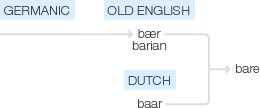Bare
Old English bær (noun), barian (verb), of Germanic origin; related to Dutch baar .
wiktionary
From Middle English bare, bar, from Old English bær(“bare, naked, open”), from Proto-West Germanic *baʀ, from Proto-Germanic *bazaz(“bare, naked”), from Proto-Indo-European *bʰosós, from *bʰos-(“bare, barefoot”).
Cognate with Scots bare, bair(“bare”), Saterland Frisian bar(“bare”), West Frisian baar(“bare”), Dutch baar(“bare”), German bar(“bare”), Swedish bar(“bare”), Icelandic ber(“bare”), Lithuanian basas(“barefoot, bare”), Polish bosy(“barefoot”).
From Middle English baren, from Old English barian, from Proto-Germanic *bazōną(“to bare, make bare”).
Inflected forms.
etymonline
bare (adj.)
Old English bær "naked, uncovered, unclothed," from Proto-Germanic *bazaz (source also of German bar, Old Norse berr, Dutch baar), from PIE *bhoso- "naked" (source also of Armenian bok "naked;" Old Church Slavonic bosu, Lithuanian basas "barefoot"). Meaning "sheer, absolute" (c. 1200) is from the notion of "complete in itself."
bare (v.)
"make bare, uncover," Old English barian, from bare (adj.). Related: Bared; baring.
